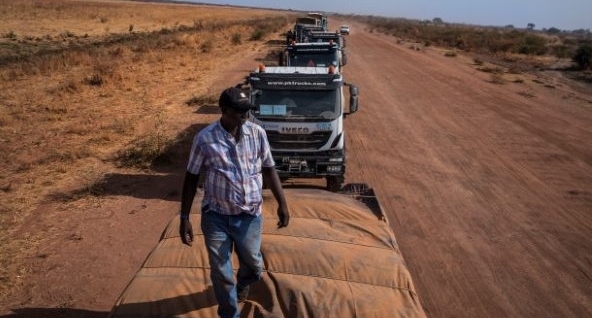WFP resumes direct delivery of humanitarian aid from Kenya to South Sudan
For the first time since 2018, the United Nations World Food Programme (WFP) has managed to send a humanitarian convoy from Kenya directly into South Sudan via the Nadapal Border crossing.

June 09, 2020: For the first time since 2018, the United Nations World Food Programme (WFP) has managed to send a humanitarian convoy from Kenya directly into South Sudan via the Nadapal Border crossing.
The nine-truck convoy, carrying 280 metric tonnes of food enough to feed 20,000 people for a month was loaded in Kenya’s port city of Mombasa and took three days to reach Kapoeta, east of South Sudan’s capital Juba. WFP had delivered millions of tonnes of relief cargo through the route before humanitarian deliveries were discontinued because of poor road conditions and insecurity.
“Our backs are against the wall and time is of the essence,” said Matthew Hollingworth, WFP country director in South Sudan. “The effectiveness of our response will very much depend on how soon we get supplies into the country and move them to where they are needed the most.”
The re-opening of the route cuts travel times by half and will help speed up getting essential cargo into hard-hit areas of South Sudan before most roads close with the onset of the rainy season.
“We need to keep both humanitarian and commercial cargo flowing if we are to stand a chance to reduce the threat posed by a deadly combination of hunger and Covid-19,” added Hollingworth.
South Sudan is reeling from multiple crises, not least the Covid-19 pandemic and an invasion of desert locusts in Equatorial state. Food security and livelihoods were already under severe threat in South Sudan before Covid-19.
More than 6.5 million people, which is half the country’s population are expected to face severe food insecurity at the height of the hunger season in July. The virus, desert locust invasions and renewed violence in parts of the country will exacerbate food needs. An additional 1.5 million people are expected to require food assistance.
While South Sudan’s borders have remained open for cargo, allowing the United Nations to continue bringing in food, medical and other essential supplies, restrictions and lengthy delays at some border crossings are now threatening food security as cross-border trade has slowed down.
In view of the risk of spreading the virus when people move, WFP, in conjunction with health and transport authorities, is establishing Covid-19 testing facilities at the border post to screen for Covid-19 among truck drivers and other workers.
WFP imports an average 325,000 metric tonnes of food annually into South Sudan to cover food gaps and complement locally grown foods. While some food is purchased in the country, the bulk is imported by road through three main corridors in the South, West and North of the country.
The southern corridor, from Mombasa and through Kenya and Uganda, remains a key artery both for the country’s economy and WFP’s response, accounting for half of South Sudan’s imports.


